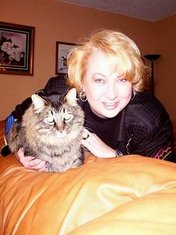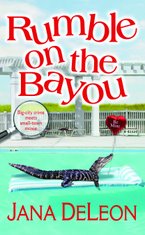A strange thing happened to me on Friday night. My husband got home from work and asked me "what do you have going on this weekend?" So I thought for a minute, then a minute more, and finally realized I didn't have a single thing that I HAD to do. Needed to do, sure - ought to do, of course, but not a single HAD on the list. It's a miracle! And one that I'm pretty sure hasn't happened since sometime before October of last year.
So I had a fabulous weekend. Of course, I still got some things done - saw 300 (which I will probably talk about tomorrow), bought new cushions for my patio furniture - and why didn't anyone tell me how expensive patio furniture cushions were - egads! Formula 1 season opened Saturday night and Ferrari won - WHOOHOO! Went and visited my parents on Sunday - had Mexican food, drove around a bit and sat outside and chatted - very relaxing.
On Friday, Helen asked some questions about my writing process and I'm going to try and answer them here. Here's the first set:
How do you begin your novels? Do you write pages of character descriptions? Do up type "Chapter One", start with the story and see where the narriative will lead you? Do you list or outline any at all?
My answer: It's different every time and for every book. Remember, I'm going to hell in my own way and you have to find the way that works for you. :) Writing method is a completely personal thing and one writer's method has nothing to do with what another should do. You need to start somewhere if you want to write and through trying different methods, you will find the perfect fit for you. That being said, I begin my novels with a concept - HIGH concept - nothing else will sell. If you don't know what high concept is - start your research there. I never write character descriptions - my characters develop out of my plot. I never wrote outlines until I had to sell on proposal. And believe me, even a proposal outline is subject to change when you start writing the book.
No one should worry about writing method when they're starting. They should worry only about getting a high concept idea and learning writing technique. How you apply the technique will evolve over time and it will rarely remain stagnant. Good books to start with on writing technique are Writing the Breakout Novel, Donald Maas; Scene and Structure, Jack Bickham. And remember, it took me years of studying (and I mean 40+ hours a week) technique, before I produced a saleable novel. Ultimately, the only way to ensure you've learned from what you've read is to write and write and write and write - until you're good enough to sell.
Do you ever reach a roadblock about 1/3 of the way into a book? If so, what do you do then?
All writers reach this roadblock. It's called the "sagging middle" and there are simply reams of information on it out in cyberspace and in technique books. Essentially, the answer to the sagging middle is simply - you write through it. Nora Roberts said two things that make a lot of sense to me: "Give yourself permission to write crap" and "You can't edit a blank page." Keep going. It's works itself out eventually.
Do you wait until a book is complete before you show it to your cp?
Again, this is one of those things that is different for every writer and every book. My process has evolved over time. I prefer to give my cp's the entire book. I am writing with mystery elements and want to ensure continuity in the story. It is much easier for cp's to catch a problem with continuity if they can read the entire story in a small window of time. That being said, when you're on deadline, that's not always feasible. I sent UNLUCKY out in two parts - first half, second half.
So enough of me for today. I'm off to reconcile accounts this morning and order some training manuals, and schedule a Webex training and all other manor of fun stuff I do at the day job.
Have a great day!
Monday, March 19, 2007
Subscribe to:
Post Comments (Atom)
Musings of a Louisiana Liar

Everyone knows what "they" say about opinions, but we all have one anyway so why not publish it - right? Welcome to my somewhat limited and sarcastic view of the world.
About Me
- Jana DeLeon
- Married, three dogs, three cats, one brain cell remaining......
Coming October 30, 2007

UNLUCKY
My debut!

RT Book Reviews TOP PICK!
Blogs I Read
Blog Archive
-
▼
2007
(200)
-
▼
March
(17)
- GCC Tour - I Take This Man by Valerie Frankel
- Why Conferences?
- Wednesday Movie Review
- You Gotta Love Traveling
- Hangin' at the Airport
- Tuesday Movie Review - 300
- Monday Morning
- On Being a Writer
- More of the Three P's
- Preparation, Planning, Production
- Back in the Saddle
- I'm BaaaaaACK
- GCC Tour - Super Mom Saves the World
- Short Update
- Still Here
- Doc-In-A-Box
- Anchoring Yourself
-
▼
March
(17)
4 comments:
Thank you, Jana, for answering my questions. I have written shorter items for years, starting in childhood. Short stories, essays, letters to the editor. Then I had an idea for a novel that I thought about for years, beginning with setting and characters. Had a vivid dream one night about the plot for this book. Woke up, grabbed a piece of notebook paper and jotted it all down. Made a New Years Resolution: lose weight and write that book!
(I have lost 26 lb.) I also lost that piece of notebook paper with the plot. Have turned the house upside down. It's as though it evaporated--or I just dreamed that part, also. Anyway, I started writing, chapter one, page one and found it easy for the first 60 pages. Then I noticed my "strong" heroine fainted everytime something happened to further the plot(3 times in 60 pages)and that another main character had disappeared from the story line. At that point, I didn't know who was going to solve the crime, or whodunit. So I stopped and turned to writing manuals for help. A book entitled HOW TO WRITE A BOOK (OR A NOVEL) simply says that a particular talent is needed for this and one either has it or one does not. Phyllis A Whitney has 2 writer's manuels and I bought the most recent. She uses a notebook with dividers and does a lot of planning or prewriting. I read Stephen King's book ON WRITING and learned that he doesn't do all the stuff Phyllis does. Another book on writing I found at the library advises one to write the ending first, then work toward that ending. So you are right in that there is no one way to write a book. Or to do anything else. After reading your answer, I have decided to get the books you recommended and keep on writing the book. If it does not get published commercially, I will at least have the satisfaction of finishing it. Maybe I'll learn enough to write and publish the next one. I write because I have to, because I love it, and love books. (It gives me a reason to get out of bed and it keeps me off the streets. Hey!) Thanks again for your time and information. I loved RUMBLE and am looking forward to UNLUCKY. Helen
I wish I had nothing to do on my list!! I have so much to do and more keeps being added on as my release day nears. It's tough to keep up with and very distracting! :) :)
helen - hope that helps! Someone else (can't remember who) said "writing is not for sissies." Me thinks they might be right. :)
Kelly - I sooooooo know how that is. If you need any help or have any questions, please let me know. Don't know what the heck kind of wisdom I can impart, but I'm willing to try!
Great information, Jana. Thank you!
Like many others, I've written for years and years. Sometimes for publication, sometimes, not. And I've studied writing for many more years!
I've had some short, non-fiction stuff published but always wanted to try fiction. I don't know if I ever WILL finish any fiction. I start a lot of stuff and never finish it.
How you (and many others) do it and work full time is just beyond me! I admire you for being able to - somehow - juggle all of it! Maybe I'll be able to do it someday - or not.
You're absolutely right, of course. The same method doesn't work for everyone. And writing sure ain't for sissies! But it can be a lot of fun - and a great outlet - even if I never manage to write a novel that could be published!
Post a Comment